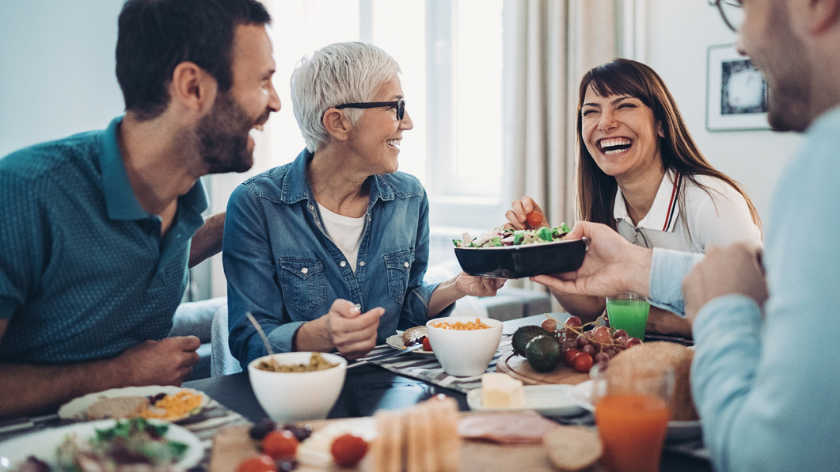There’s a lot to consider as things open up and we step back into social events, in-person activities, traveling and the workplace, among others – and it may feel overwhelming. You may feel hope and excitement but also fear and worry at the same time. This pressure and mix of emotions are common after experiencing collective trauma like a pandemic or natural disaster. And for most people, stepping back in will be an adjustment.
Sometimes thoughtfully easing through big change is helpful – see if these tips help make it easier for you to “step back in.”
- Take time to work through your emotions
- Stay true to yourself and your comfort level
- Be accepting of others’ circumstances and their individual pace
- Practice flexibility and be open minded
- Bring forward a new mindset, knowledge, or skills you may have learned along the way
- Continue to pay attention to your mental wellness and check in on yourself regularly
Take time to work through your emotions
Take time to recover from the ups and downs the pandemic may have caused you and those around you. Working through this time is likely a process and not an overnight solution. Often writing down your thoughts and worries or sharing them with others can help – you may be surprised to find out you’re not alone. Your friends and family may have helpful tips that they’ve used to manage their emotions.
It doesn’t matter your pace in working through your emotions as long as you keep at it and recognize when you may need help. If you do feel stuck, feel down or anxious most days for two or more weeks, reach out for professional help. Many states and local health departments have a COVID mental health hotline – or, check with your doctor, health insurance, telehealth provider or employer to find a counselor that can help you work through your concerns.
Stay true to yourself and your comfort level
When stepping back in, be kind to and stay true to yourself and your comfort level. Again, it’s OK to go at your own pace. If you’re hesitant to or even dreading getting back out there, take it one step at a time. Taking it easy and gradually exposing yourself to social situations and public places can be helpful. Consider some of these ideas:
- Go to a social event with a friend by your side
- Start with a small gathering(s) before going to a large event
- Take a practice run of your commute, before you go back to work in-person
- If someone is critical of your pace, own it and say: “I’m easing into social events” or “I am being playing it safe and taking one step at a time”
Be accepting of others’ pace
At the same time, be mindful of others’ circumstances and experiences and accept their unique pace. If they’re not comfortable going out and about, offer them support instead of chiding them. On the other hand, if others are out socializing and in public more than you feel comfortable, don’t judge them. Remember you can’t control others’ actions, only your own. Spend time and energy on what you can control. For instance, these are in your control:
- your own words and actions,
- how much you try to engage in healthy habits,
- finding enjoyable things to do;
while these are out of your control:
- the news,
- what others say or do,
- predicting the future and
- time.
Practice flexibility
The coronavirus, COVID-19, the vaccine and everything about this pandemic has caused a lot of uncertainty. When you try to be open minded and realize that the virus itself as well as what experts learn about the virus, how to prevent and treat it continues to change, you’ll feel more at ease. Being flexible and accepting that fact can help you react to changing information instead of worrying every time a new finding or recommendation is released.
Bring forward a new mindset or skills you may have learned along the way
When you’re in a state of emotional stress it may be difficult to think about the “silver lining” or “lessons learned” but taking time to reflect can be very therapeutic and helpful in your everyday going forward. Reflecting on what you’ve learned can also help you build resilience skills for future stressful times. For example: Did you teach your parents or grandparents how to use video chat and now can carry on more regular connections? Did you start a new hobby? or craft? Did you find you’re mentally stronger than you thought you were? Did you start a new exercise routine? Did you find new ways to connect with your immediate family like family game night?
Pay attention to your mental wellness
Finally, when gradually stepping back in, pay attention to your mental wellness and continue to check in on yourself regularly. We’ve found practicing these daily activities can give your mental wellness a boost. Give them a try!
- Jot down what I’m grateful for
- Practice mindfulness
- Do a favor for someone else
- Connect with others
- Try something new.





